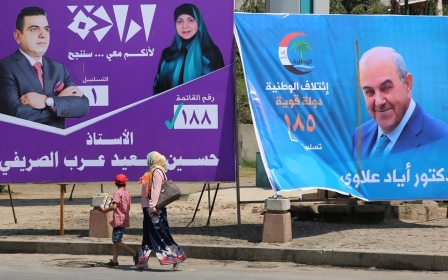Iraq's top Shia authority warns against voting for corrupt officials
Iraq’s top Shia authority Grand Ayatollah Ali al-Sistani warned Iraqis on Friday against voting for corrupt officials in elections slated for 12 May, in a rare intervention in politics.
Sistani’s comments were relayed by his representative Abdel Mehdi al-Karbani as part of a weekly sermon in the Iraqi holy city of Karbala.
The ayatollah, whose opinion holds enormous weight with Shia in Iraq and around the world, said Iraqis should "avoid falling into the trap of those ... who are corrupt and those who have failed, whether they have been tried or not".
According to Karbani, Sistani insisted he was keeping an “equal distance” from all candidates, taking care not to name any in his sermon.
Sistani appeared to allude to certain politicians nonetheless.
"Past electoral experiments were marked by failures, many of those who were elected or appointed to high positions in the government abused their power and took part in spreading corruption and squandering public money," Sistani said.
Many of those who were elected or appointed to high positions in the government abused their power
- Grand Ayatollah Ali al-Sistani
According to political analyst Aziz Jaber, this clearly targeted “heads of lists who have held government jobs and MPs such as vice-presidents Nouri al-Maliki and Ayad Allawi.”
Sistani and Maliki have clashed previously, with the former blocking Maliki’s re-election as prime minister in 2014, which opened the door for present incumbent Haider al-Abadi. Maliki is seeking re-election as prime minister.
Abadi, who leads a list of candidates and hopes to be re-elected as prime minister, has been accused by critics of failing to tackle Iraq’s chronic corruption problem.
Transparency International has previously ranked Iraq as the 12th most corrupt country in the world, in terms of public perception.
Some 21 million Iraqis have registered to vote in next week’s elections, and will be electing 320 candidates out of a pool of around 7,000 candidates.
However, only around 20 percent of candidates are newcomers and political outsiders, Iraq’s electoral commission has said.
Sistani has often made important interventions in Iraq.
In 2014, the Shia cleric mobilised tens of thousands of men to join the battle against the Islamic State group (IS) as part of the Hashd al-Shaabi (Popular Mobilisation) forces, which then played a key role in defeating the militant group.
Stay informed with MEE's newsletters
Sign up to get the latest alerts, insights and analysis, starting with Turkey Unpacked
Middle East Eye delivers independent and unrivalled coverage and analysis of the Middle East, North Africa and beyond. To learn more about republishing this content and the associated fees, please fill out this form. More about MEE can be found here.




